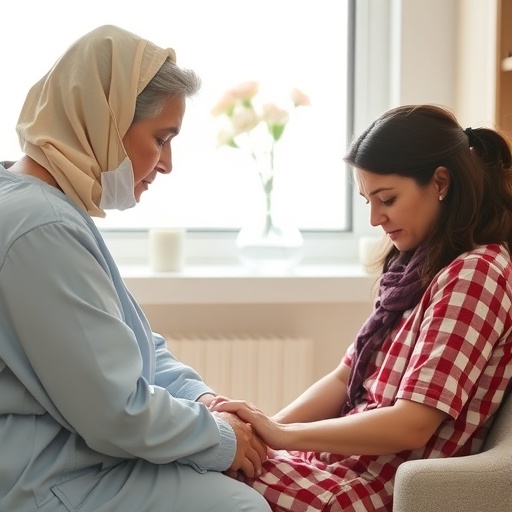In the intricate dance of cancer, where hope and despair intertwine, the experience of spousal caregivers emerges as a profound narrative in understanding the illness’s psychological toll. A recent study spearheaded by researchers Qiu, Li, and Pan dives deep into the emotional landscape of older spousal caregivers, illuminating the fear associated with disease progression among this pivotal yet often overlooked demographic. Their findings, set to appear in BMC Nursing, bring to the forefront the complex dynamics that govern caregiving in the context of terminal illness.
The study employs a cross-sectional design to gather data from a diverse group of older spousal caregivers, revealing a tapestry of emotional responses influenced by various factors. Understanding the underlying concerns of these caregivers is crucial, as they play an integral role in the cancer care continuum yet often carry the weight of unaddressed fears and anxieties. The researchers meticulously delineate these fears, tracing their origins and implications on both caregivers and patients alike.
At its core, the study underscores the prevalence of fear related to disease progression. This fear often manifests in various forms, influencing caregivers’ mental health, their capacity to provide care, and ultimately, the quality of life for both the caregiver and the cancer patient. Many caregivers express a profound sense of helplessness, grappling with the unpredictability of the disease, which can lead to a diminished sense of agency over their circumstances. This sentiment resonates deeply, reflecting a universal struggle faced by those caring for terminally ill loved ones.
Factors contributing to this fear are multifaceted. Emotional support, or the lack thereof, emerges as a significant determinant. Caregivers who report a lack of social support experience heightened anxiety regarding the progression of their loved one’s illness. This highlights the need for robust support systems that can provide not only emotional balm but also practical assistance in navigating the arduous terrain of caregiving. By fostering an environment of support, the fears associated with disease progression can be mitigated, allowing caregivers to focus on providing compassionate care.
Moreover, the relationship between caregiver and patient is crucial. The dynamics of their bond—historical, emotional, and communicative—play a pivotal role in shaping the caregiver’s fears. Partners who maintain open lines of communication tend to exhibit lower levels of anxiety about progression. This suggests that interventions aimed at enhancing communication within the caregiving relationship could help alleviate some of the psychological burdens experienced by caregivers.
Interestingly, the study also reveals that caregivers’ perceptions of their own health directly impact their emotional responses. Those in poor health are more likely to express significant fear of disease progression for their loved ones. This self-referential anxiety enhances the cycle of distress, where the emotional state of the caregiver reflects back on the patient, potentially exacerbating the patient’s condition. Thus, addressing caregiver health—both physical and mental—should be an integral part of cancer care strategies.
The implications of this study extend to healthcare professionals who interact with caregivers. Recognizing the emotional landscape that caregivers navigate is essential for providing holistic care. Clinicians need to incorporate assessments of caregivers’ mental health into routine practice, offering interventions such as counseling or support groups tailored to their unique challenges.
In an era where patient-centered care is paramount, caregivers must not be relegated to the periphery. Their experiences, fears, and worries should be integrated into therapeutic frameworks, ensuring that their voices are heard and their well-being prioritized. The insights gathered from Qiu, Li, and Pan’s research advocate for a shift towards a more inclusive approach in cancer treatment, one that recognizes caregivers as integral players in the healing process.
The emotional ramifications of the study extend beyond mere statistics; they resonate on a personal level, tapping into the collective consciousness of families grappling with cancer. As families cope with the complexities of life-altering diagnoses, understanding caregiver fear can shed light on broader societal issues surrounding caregiving, illness, and emotional well-being.
As the healthcare community strives for improvements in cancer care, the lessons gleaned from this research offer a beacon of guidance. Fostering resilience among caregivers not only benefits them but also enriches the caregiving experience for patients. This symbiotic relationship can lead to improved outcomes, both psychologically and physically, for individuals embroiled in the struggle against cancer.
In conclusion, the study authored by Qiu, Li, and Pan stands as a critical contribution to our understanding of the caregiver experience amidst disease progression fears. By illuminating the intricate interplay of emotional support, health perceptions, and interpersonal dynamics, the research serves as a rallying call for improved caregiver interventions. Acknowledging and addressing caregivers’ fears will pave the way for a more compassionate approach to cancer care, fostering not only survival but a profound appreciation for the resilience of the human spirit.
Overall, as discussions surrounding cancer care evolve, it is imperative that the concerns of caregivers are met with empathy and actionable strategies. Engaging the entire network surrounding cancer patients—including spouses, family members, and friends—will ensure that the fight against cancer encompasses both physical and emotional dimensions, ultimately leading to a more humane healthcare paradigm.
Subject of Research: Fear of disease progression among older spousal caregivers of cancer patients
Article Title: Factors associated with fear of disease progression among older spousal caregivers of cancer patients: a cross-sectional study
Article References:
Qiu, R., Li, Y., Pan, Y. et al. Factors associated with fear of disease progression among older spousal caregivers of cancer patients: a cross-sectional study.
BMC Nurs 24, 1381 (2025). https://doi.org/10.1186/s12912-025-04035-3
Image Credits: AI Generated
DOI: https://doi.org/10.1186/s12912-025-04035-3
Keywords: Caregiving, Cancer, Disease Progression, Emotional Support, Mental Health, Caregiver Anxiety, Spousal Caregivers, Patient-Centered Care.
Tags: anxiety in cancer caregivingcancer care continuumcomplex dynamics in caregivingemotional responses to terminal illnessemotional toll on spousal caregiversfear of disease progressionimplications of caregiver fearsmental health challenges of caregiversolder caregivers’ experiencespsychological impact of caregivingquality of life for caregiversresearch in cancer caregiving





